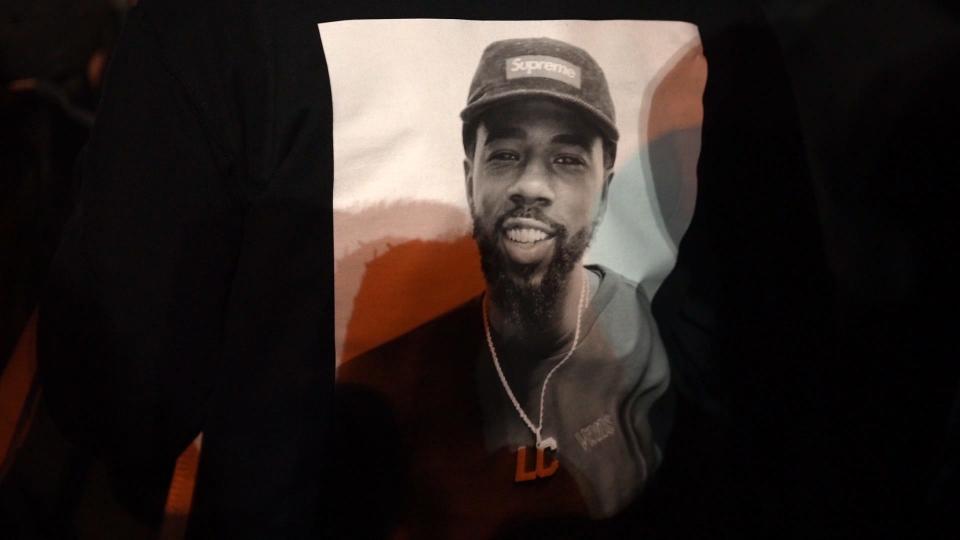Najee Seabrooks bill: NJ legislation to create crisis response teams moves ahead
Paterson would become one of six cities in New Jersey to create community crisis response teams under a proposed state law partly named after Najee Seabrooks, who was shot and killed by city police last March.
The bill, also named for Drew Washington, who was killed in a Jersey City police shooting this year, gained approval from a state Senate committee on Thursday afternoon and is expected to get approval from the full Legislature next week.
Supporters say the community response teams would save lives by de-escalating the type of mental health crisis situations that in the past ended with fatal shootings by police officers.

“This legislation is critically needed because it is clear that the police, despite their enormous resources and training, are not the most effective responders to mental health crises,” said the New Jersey Violence Intervention and Prevention coalition.
“The tragic police killings of Najee Seabrooks in Paterson and Drew Washington in Jersey City argue for much greater investment in community-led strategies that are rooted in public health and proven to heal communities — and away from system approaches that focus on punishment and inflict harm,” said the Violent Intervention Coalition.
What would the law do?
The law would allocate up to $2 million for community groups to create crisis response teams in six counties — Passaic, Essex, Hudson, Mercer, Middlesex and Camden. Under the criteria, Paterson along with Jersey City and Newark would be among the sites.
The Paterson Police Department declined to comment on the proposed Seabrooks law.
The bill does not include details on exactly how the crisis teams would operate. For example, it doesn’t say whether they would substitute for police in 911 mental health calls, or if the community groups would handle cases in which someone in crisis were brandishing a gun or knife.
Supporters of the legislation testified on Thursday that the parameters of the program would vary from county to county based on each community’s needs and wants.
Watch now: Life and controversial death of Najee Seabrooks is subject of new documentary
Paterson Healing Collective could operate crisis response team
The Paterson Healing Collective, or PHC, the violence intervention organization for which Seabrooks worked when he was killed, looms as the likely community group to operate the crisis response team in Passaic County. Formed in 2020, PHC’s main role has been helping violence victims and preventing retaliation. Seabrooks got involved after he was the victim of a Paterson street shooting in 2021.
Seabrooks had called Paterson police for help last March, saying during his 911 calls that he was afraid someone was trying to kill him. City patrol officers responded to the apartment where he was barricaded inside a bathroom and allowed him to speak through the door to his mother. But she was unable to persuade him to come out of the bathroom, video recordings of the incident showed.
Eventually, the police department’s emergency response team — officers with riot helmets and shields — took control of the scene and tried to get Seabrooks to come out. After almost five hours, he bolted from the bathroom, lunging at the police with a knife in his hand, and was fatally shot.
During the standoff, Seabrooks contacted PHC members with his cellphone and asked them for help. But the police would not allow them inside the apartment.
Najee Seabrooks case full coverage: From the Paterson police shooting, to Platkin takeover
Paterson Healing Collective member testifies
Among those who testified in favor of the Seabrooks bill during the Senate committee hearing on Thursday was Quan Hargrove of the Healing Collective, who recalled being called by his friend to come to the bathroom confrontation.
“I was there because he asked me to come,” Hargrove told the Senate panel. “However, I was not afforded the opportunity to help my dear friend.”
Hargrove testified that he pleaded with the police to let him speak with Seabrooks but was denied.
“I wonder if I had been given the opportunity would the outcome have been different,” Hargrove said.
Seabrooks’ cousin, Nicole Ricketts, also testified at the hearing. Ricketts said that “Black and brown” people endure what she called “preventable” police violence in disproportionate numbers.
Casey Melvin of the Healing Collective told the Senate committee that hundreds of people from Paterson support the creation of the crisis response teams.
Besides establishing pilot programs, the proposed law also would create Community Crisis Response Advisory Councils in the six counties.
Joe Malinconico is editor of Paterson Press. Email: editor@patersonpress.com
This article originally appeared on NorthJersey.com: Najee Seabrooks law in NJ for crisis response teams advances

